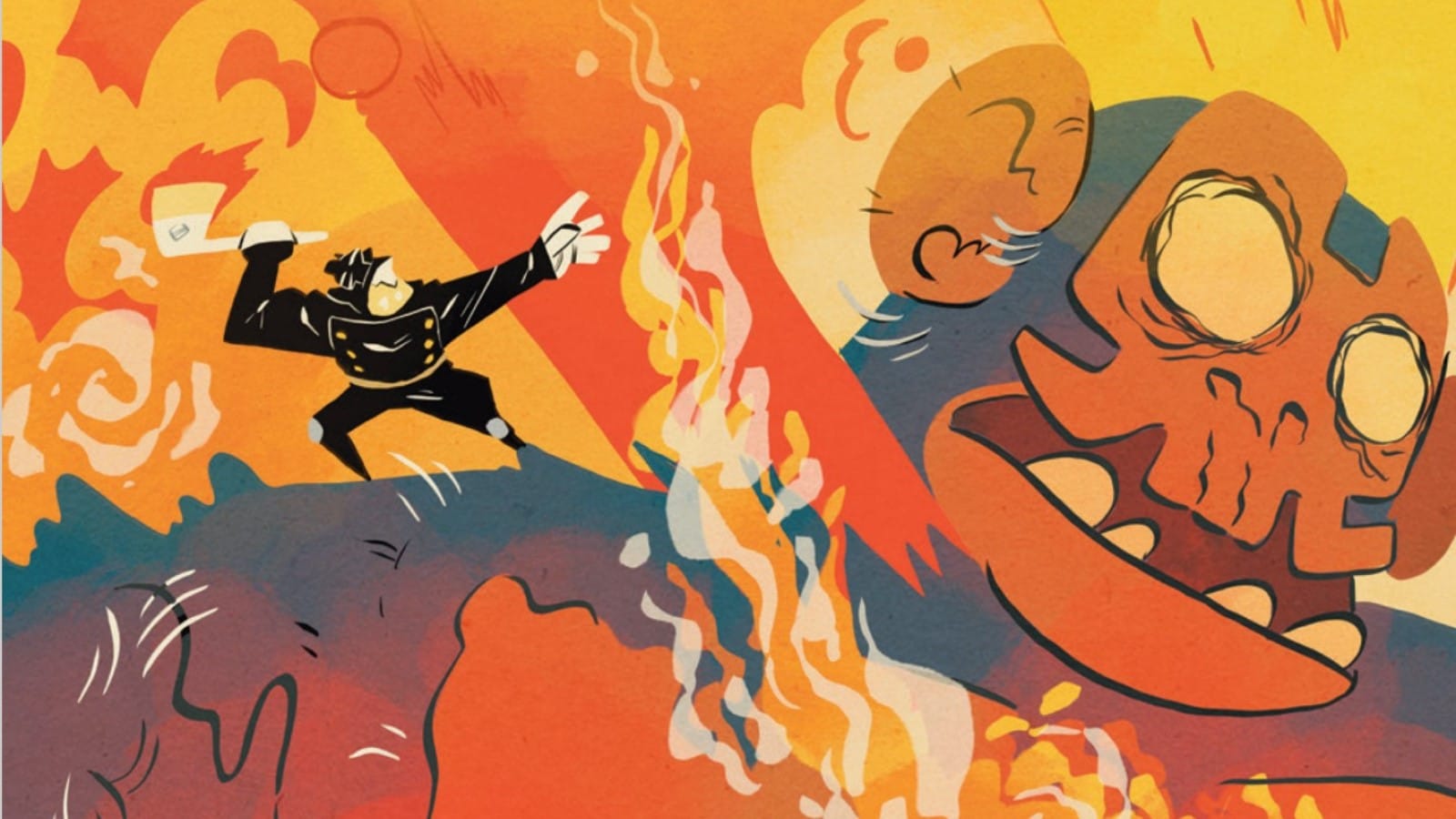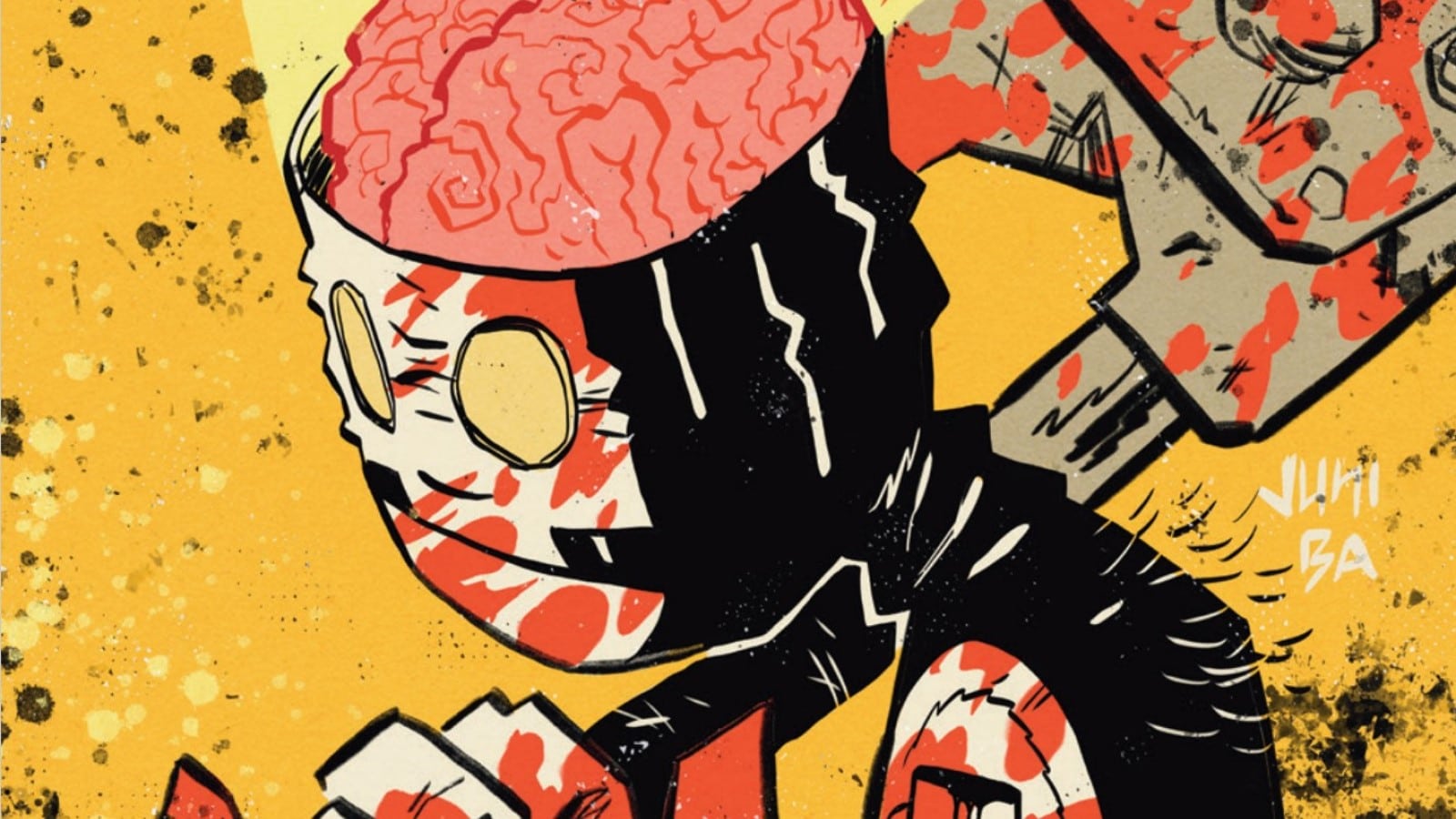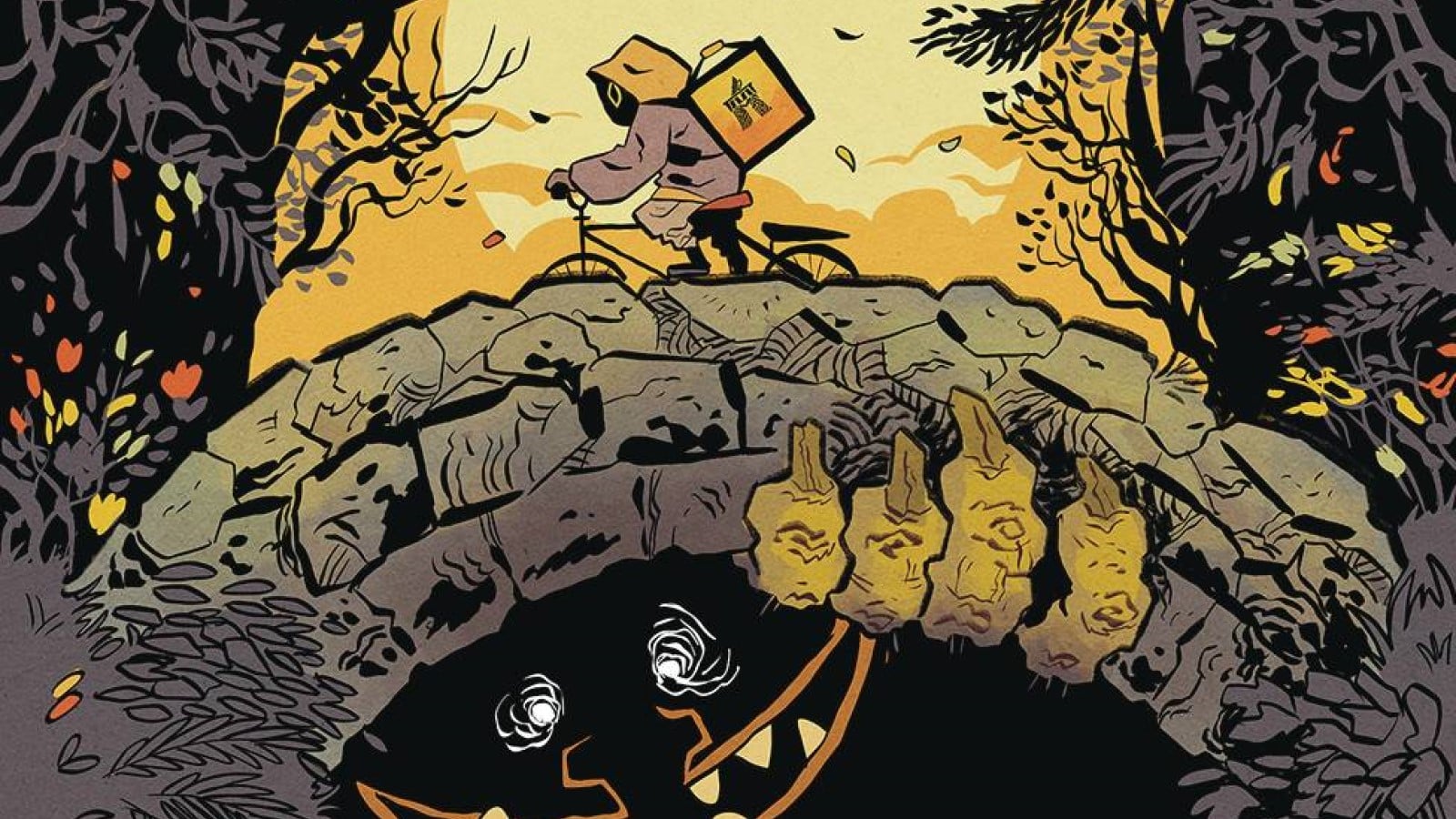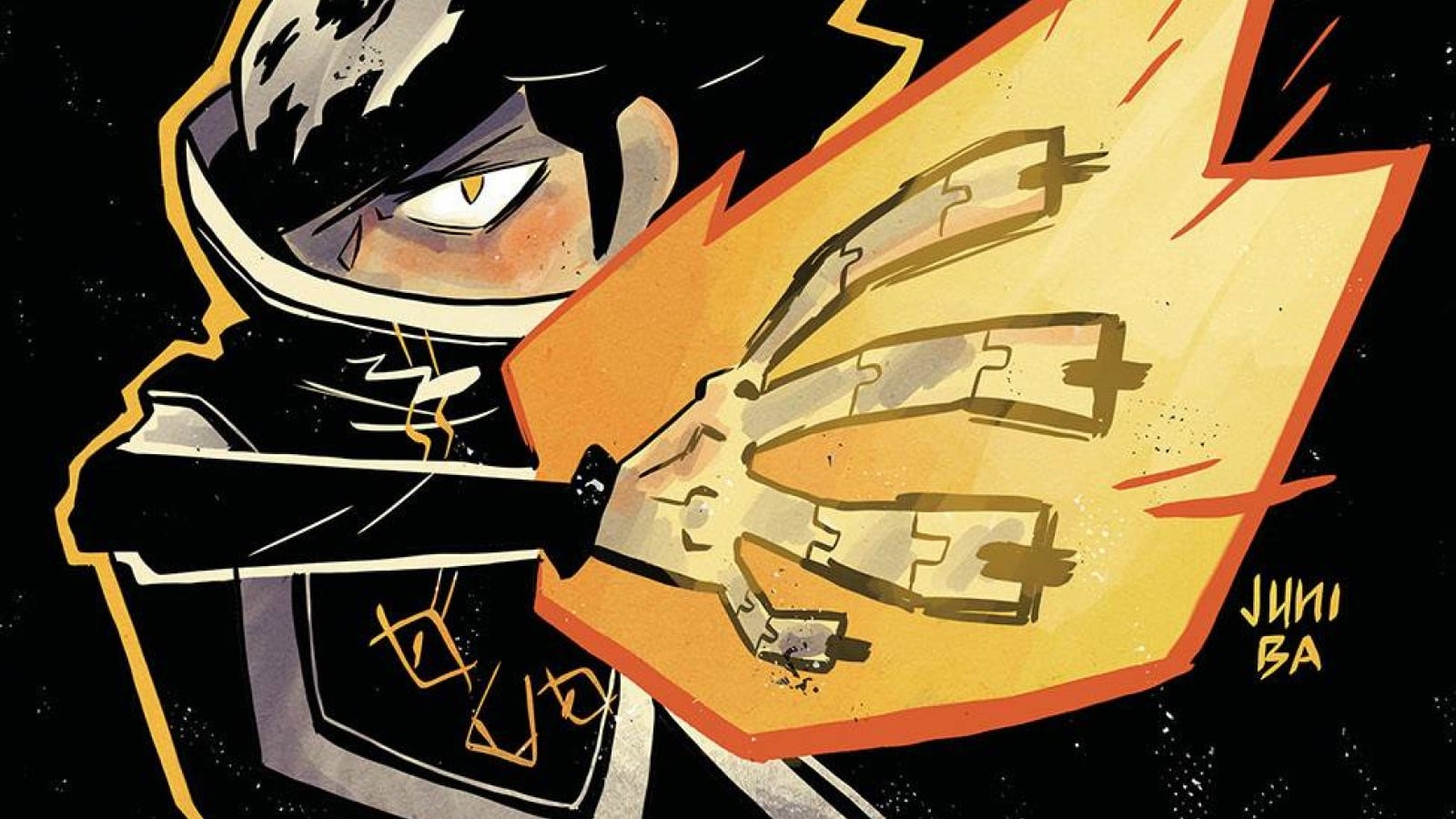Meet Astou, Monkey Meat’s number one fan! She’s gotten a job at the Monkey Meat Motel, working alongside her hero, Thaddeus Lug himself! Could anything tarnish his standing in her eyes? Say, cries of injustice from a fountain of soul juice, harvested from the village that was wiped out after he helped discover them? Find out in Monkey Meat #4, a Juni Ba creation (with special authorization from the Monkey Meat Company).
Armaan Babu: It’s important to know when to quit. For Thaddeus Lug, it’s too late to be able to quit when God himself has sold your soul to Monkey Meat Multinational (MMM). Not even death frees Lug from his service, as we’ve found. Fortunately, it’s not too late for everyone, as we find out this issue, and as long as my co-writer on this hasn’t quit on me, we’re here to talk about it!
Ritesh?
…Ritesh?
Ritesh Babu: ALL HAIL THE MONKEY MEAT CORPORATION!! ALL HAIL THE CORPORATE OVERLORDS!!
…ahem, hello there, Armaan. Let’s get started, shall we?
Harnessing the Fandom Souls

Armaan: This is a particularly fiendish opening for a comic that’s all about how big corporations mistreat … well, everyone they come across, really, but in particular the people who work for them. MMM advertises a job that sounds like a wonderful employment opportunity, but as a prize for fans. Who loves the company best? It’s a competition — one that, of course, is most easily judged by how much of their merch is bought — and after pouring their love, their time and their money into this company, what does the winner get?
They don’t really get anything. The winner’s just placed in a spot where they can now give their labor to the company as well. But hey, that’s just Page 1, and on Page 2 all my derision gets thrown out the window immediately because dammit, I want Monkey Meat merchandise, too. I mean, there’s a Monkey Meat Monopoly board game. Tell me Monopoly wouldn’t be improved 1,000% by adopting Juni Ba’s over-the-top satirical approach to criticizing capitalism.
Ritesh: This issue is entirely about and deeply dedicated to standom and stan culture, and by god! By god, Armaan, I tell you, I cackled! In an age where legions of Let’s Talk accounts and Ebooks accounts and stan collectives amass on social media to profess their faith in their favorite IPs held by their supreme corporate-lords, this is perfect.
I was really thinking of things like DC FanDome, for instance, and the sort of deeply cultish behavior I saw around that both times it happened. Saying anything against it seemed to incite a sort of backlash that almost felt like you spoke against some deeply sacred religious holiday.
The way corporations swindle and con their audiences into loving them and the narratives they weave around them, with the “heroes” and “mythic figures” they boast as their chief icons, that’s all too real, and particularly real in the realm of comics, I think. So much of comics history is overenthusiastic fans willing to slave away for years and years for pretty much nothing whilst their parent companies suck away every shred of creative energy they possibly can. They’ll own nothing, and many of them sadly don’t even seem to mind that too much. They’ve been tricked into thinking that the sheer act of service for them, under the banner of their appealing icons, is in itself a grand, meaningful, purposeful existence requiring no real compensation. That it is reward enough. It’s like a goddamn religion for some people. It’s a bloody cult.
I’m also reminded, in this regard, of an excellent RPG session Kieron Gillen ran two years back with Matt Fraction, Chip Zdarsky, Ed Brubaker, Emma Vieceli and Marguerite Bennett. It’s up on YouTube, and it’s set around the comics industry, with each individual above playing a comics industry person. And here’s the thing: It sometimes gets BRUTALLY real, with folks’ eyes popping, them giggling or growing eerily silent as they’re clearly aware of how real some of the stuff they’re jokingly gesturing at is. In said RPG, Zdarsky plays GARY NUTLUFF, the parasocial comics fanboy who is such a diehard fan that he is absolutely ready as hell to take the job of the fired and screwed over creative team that made the book he loved so much. His loyalty isn’t to the team, people he actually knows and likes, it’s to that damn IP and corporation, and it’s so scarily real. It’s the kind of mindset that’s everywhere.
These corporations own so many headspaces rent free, and that’s what we see here with Astou. Here she is, the ultimate success story! The upheld ideal! She is The Number #1 Fan! She is the ultimate super-stan of the Monkey Meat corporation and loves their iconic hero Thaddeus Lug! All she wants to do is serve and work under the magisterial might and enterprise of the legendary corporation. By god, by god, this is murder of not just comics as an indusry, but the entertainment biz at large. I’m shook.
I cackled so goddamn much. I love this book, Armaan. I love this book so goddamn much.
Armaan: Heh. I get the feeling you’d love some Monkey Meat merch yourself.
So we get a couple of pages of typical Monkey Meat terribleness. They’re at a party for the elite, where Thaddeus is in charge of security and Astou’s in charge of general service, going by her uniform. It’s a relatively small panel here, but I enjoyed watching the party and seeing what all the elites were trading in. Weapons, firearms, gift shop merch, we even get a little cameo of God here dealing in the souls trade.
As we’ve seen repeatedly, monkey meat isn’t the company’s real golden goose; it’s souls. Harvested as eternal employees (like Thaddeus Lug, and, if she works there long enough, Astou too, probably), or, uncreatively but profitably, as juice. I think the most horrific part of that is the sheer banality of it. They harness souls and just … pour them out as a refreshing beverage.
These souls in particular are, as we soon find out, the souls of the Oompas (a reference to one of pop culture’s most famous race of people exploited by a major industry?), a tribe that’s “unexpectedly” become no more. It’s tragic, truly; buy a plushie at 50% off, it’s in their honor. It’s too much for the souls in the fountain to take — and one of them possesses one of the elite guests to try to make sure his story is told.
The pain of this soul takes up the entire page, red and alarming, a large yellow face crying the way that only a child who doesn’t understand why they’ve been hurt can wail. Where Ba’s been cramming a lot of detail into panels up to this point, now this Oompa kid’s story is being writ large over larger, simpler panels; feelings of pain, resentment and rage meant to overwhelm.
Ritesh: Yes! What I love here is the way Ba nails how the oppressors will ravage and destroy you and your people, and then profit off your very culture, trafficking in their loss, in their tragedy, reducing them in the end to just that. They’re not content with just destroying their lives. They want to desecrate their memory, too. And so there you have it, a rich, complex culture of generations reduced to bloody fucking plushies and Funkos and other rubbish at the goddamn Monkey Meat Merch Store. A glorious people whose only memory and worth is now measured by how many shitty merch items they sold and the cash they made for the very oppressive monsters that took everything from them.
It’s brutal, but it’s also real. It’s just a step removed from how Americans will ravage and topple nations and inflict imperialism upon them, and then do a shit load of the Sad American Soldier of War movies with a goddamn yellow filter to make money for the very same corporations who helped fund the campaigns of the politicians who sanctioned those acts to begin with. Or consider just how Native Americans are frequently reduced to the most insulting stereotypes that take away from them. It’s all just … man, it’s infuriating, but this is how these systems work. They’re not here just for your land or your wealth, they’re here for your goddamn soul. That is the nature of colonialism, that is the nature of imperialism, which are deeply tied to capitalism. It’s what I was getting at here when writing about These Savage Shores.
A System of Equivalence

Armaan: What really gets me here is just how … little MMM really does with the lands they’ve taken, with the resources at their disposal. How creatively bankrupt they’ve become, because when they’re as successful as they are, creativity is no longer something they need. Uniqueness isn’t something they need, either.
Look at the journey the Oompa child takes Lug through. The variety of magical, mythical creatures the kid teaches Lug to move past. The beauty that this island once was before Monkey Meat took over and made it theirs. MMM didn’t choose to do anything with any of it — it was in the way, so it all just got erased, because of how much easier it is to erase a culture than it is to figure out its strengths and use them. Don’t get me wrong, the latter is still horrible too, but the banality of it all keeps coming back to me. How everything is erased in favor of the simplest idea, the laziest way to profit, adding insult to injury by diminishing (or entirely erasing) the very value of everything they destroyed.
Now, at the end of this kid’s story, we find out that Lug was given different instructions from the men around him. Lug thought he was only supposed to find the village, map it and go home. The Monkey Meat employees he was traveling with were the ones who knocked Lug out and burned the Oompa village out of existence. I don’t know how much this really absolves Lug, if at all. Sure, he didn’t do the burning and was taken by surprise, but as we learned in #1, Lug had been wiping cultures off the map for a while before he grew into the being we see here.
What did Lug think would happen?
Ritesh: Complicity is a huge part of this stuff, absolutely. It’s the burden Lug bears and will eternally bear. It’s who he was, and who he has been, and nothing he does now can undo it. It’s all too late. He was a fool.
And yeah, the corporation being incapable of imagination tracks for me. Allow me to post two little excerpts from the ever-relevant and eternal favorite of mine here, from Mark Fisher’s Capitalist Realism:
The power of capitalist realism derives in part from the way that capitalism subsumes and consumes all of previous history: one effect of its ‘system of equivalence’ which can assign all cultural objects, whether they are religious iconography, pornography, or Das Kapital, a monetary value. Walk around the British Museum, where you see objects torn from their Iifeworlds and assembled as if on the deck of some Predator spacecraft, and you have a powerful image of this process at work. In the conversion of practices and rituals into merely aesthetic objects, the beliefs of previous cultures are objectively ironized, transformed into artifacts. Capitalist realism is therefore not a particular type of realism; it is more like realism in itself.
That about nails it. That’s what we’re dealing with here. Of course they have no ideas. Of course all they can do is burn and destroy. All capitalism is designed to do is desecrate for the sake of money. It doesn’t care about anything else, and it encourages everyone to not just not care, but be actively hostile to caring about any of that. All that matters is money, profit, that’s it. Everything is measured by that.
It’s why bastards like Elon Musk and other rich clowns dream of colonizing other planets and fucking off this earth into the stars rather than trying to help improve the perfectly good planet we have. They speak in broad, decent-sounding, hollow platitudes that really are just about expansion, excess and endless reproduction of a predatory, destructive model that devours eco-systems, cultures and livelihoods solely to profit off the bastards who’ve already got way more than they’ll ever need for 100 generations anyway. It’s a system that cannot imagine better and like a viral entity kills any chance of it, so of course it’s completely bankrupt and devoid of imagination.
Astou Begins

Armaan: It’s awful, single-minded and the most troubling of all is how inevitable it can seem. It’s certainly worn down Thaddeus — whatever guilt he might have felt for the Oompa kid takes a distant second place to Thaddeus’ professionalism. He might have complained that he is forced to be there, but he bottles up a child’s soul to keep his bosses safe with barely a moment’s hesitation.
We know Lug’s story. We know he’s tried to fight the Monkey Meat machine and lost everything in the process. It feels like there’s no win he could possibly get.
Which is why I get a sort of miserable hope from Astou’s story. At this point in her, well, let’s call it a career, she still has a chance to quit. To not be culpable for the things MMM does, even though they’re going to do it anyway. Yes, she gets powers from her time in the soul juice and this is all very superhero origin-y, but her bending a steel bar is not her moment of strength to me. It’s choosing to walk away. It’s the Oompas, whose story was heard by at least one person, made one bit of difference.
It’s a small difference. It’s, as I said, a miserable bit of hope. Like last issue, it’s a scrap of hope torn from a mountain of tragic and exhausting inevitability, and that’s … something.
Ritesh: For sure. I love that the entire story acts as her disillusionment from her prior mindset. It is a mindset I’m sure many of us have some measure of familiarity with in our youths. The time of naivete wherein you’ve perhaps not yet begun to question all these narratives around you. Wherein you’ve still bought into some of them … until they finally unravel in front of you, and you see the truth. Learning that something’s wrong is the first big step, and it’s a hard one. Many choose denial or ignorance, to get right back on track. And I suspect that’s not what Astou will do here, given what the captions imply, though I suppose we’ll see. All in all, I’m glad we caught this milestone in her journey and saw the curtains of illusion fall in front of her eyes. She’s not so blind and bought in now. She can now really rethink some stuff, truly, properly.
Armaan: As much as I enjoyed the story, I think it did leave me feeling slightly unsatisfied — the end captions seem to imply that this particular story’s resolution is not quite here yet, this is the start of something rather than an end for a series that’s been done-in-one tales so far.
Ritesh: Very much so, given the entire narrative is strongly invoking and reliant upon the myth of Lug, who takes us right back to the start of the issue. I think the overall journey of diehard stan to disillusionment works for me, but definitely, it’s a “to be continued,” much more so than the previous ones for me. That said, I’m in for that, that shakeup in rhythm is fun, and I’m curious to see her story picked back up in an eventual issue.
I am curious as to what happens next, but before we go, I gotta ask — the ad at the back, showing us that MMM is now advertising directly into people’s dreams. Were you as disappointed as I that the website listed didn’t actually go anywhere?
Ritesh: Hahaha. I love that you checked. I did not, but yeah, had that been an actual link, that’d have been a wee bit more fun, certainly.
In any case, folks, this has been another month with Monkey Meat. Tune in next month for more on capitalism and cosmic contracts once again.






